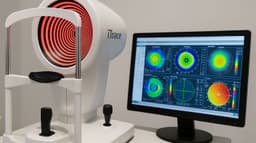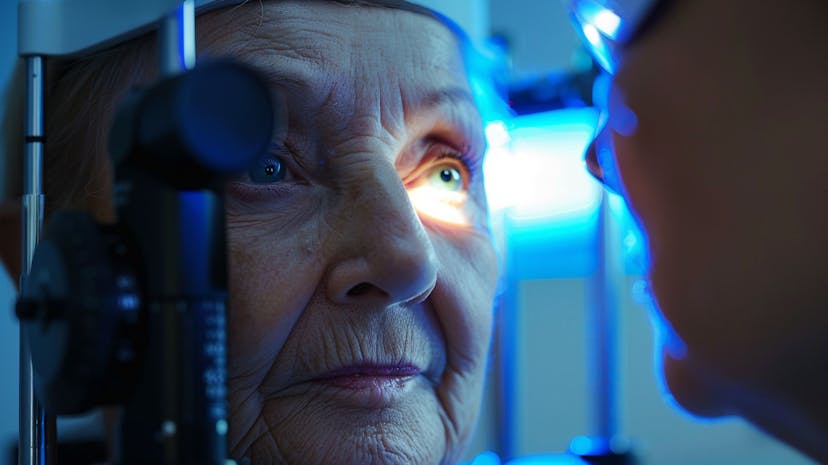
The Common Warning Signs Of Retinal Detachment
The retina, a delicate and crucial layer of tissue lining the back of the eye, plays a fundamental role in our ability to see the world around us. However, under certain circumstances, this vital structure can become detached from its normal position, posing a significant threat to vision. This condition, known as retinal detachment, demands prompt attention and specialised care. In this introduction, we'll delve into the causes, symptoms, and potential consequences of retinal detachment, as well as the importance of early detection and treatment in preserving vision and eye health.
The Symptom Of Retinal Detachment
The symptoms of retinal detachment can vary from person to person, but they often include:
Sudden Onset of Floaters
An increase in the number or size of floaters (small, dark spots or specks that appear to float in your vision).
Flashes of Light
Seeing flashes of light, especially in the peripheral (side) vision. These flashes may occur suddenly and persist for several minutes.
Blurred or Distorted Vision
Vision may become blurry or distorted as if there is a veil or curtain over part of your visual field.
Shadow or Curtain Effect
You may notice a shadow or curtain-like effect moving across your vision, typically from one side to another.
Loss of Peripheral Vision
Peripheral (side) vision may be affected, and you may feel like you're looking through a tunnel.
The sensation of Pressure or Fullness
Some people report feeling a sensation of pressure or fullness in the affected eye.
Furthermore, not everyone with retinal detachment experiences all of these symptoms, and some individuals may only have one or two of these signs. Additionally, the onset of symptoms can be sudden or gradual.

10 Causes Of Retinal Detachment
Retinal detachment can occur due to various factors, and it's important to note that some individuals may be more predisposed to this condition than others. Here are some common causes and risk factors for retinal detachment:
- Ageing: As individuals age, the vitreous gel inside the eye may change in consistency and shrink, which can increase the risk of retinal detachment.
- Posterior Vitreous Detachment (PVD): When the vitreous gel separates from the retina, it can sometimes pull on the retina, leading to a tear or detachment.
- Eye Trauma: Severe eye injuries, such as those from accidents or sports-related incidents, can lead to retinal tears or detachments.
- Previous Eye Surgery: Individuals who have undergone certain types of eye surgery, such as cataract surgery, may be at an increased risk.
- Nearsightedness (Myopia): People with high degrees of nearsightedness have longer eyes, which may increase the risk of retinal tears or detachments.
- Family History: There may be a genetic component, and individuals with a family history of retinal detachment may be at a slightly higher risk.
- Other Eye Conditions: Certain eye conditions, such as lattice degeneration (a thinning of the retina), can increase the risk of retinal detachment.
- Diabetic Retinopathy: Advanced stages of diabetic retinopathy can lead to the formation of scar tissue on the retina, which may increase the risk of detachment.
- Inflammatory Disorders: Conditions that cause inflammation within the eye, such as uveitis, can increase the risk of retinal detachment.
- Retinoschisis: This is a rare condition where the layers of the retina separate from each other, potentially leading to a detachment.
Moreover, while these are common causes and risk factors, not everyone with these factors will experience retinal detachment. Additionally, some retinal detachments can occur spontaneously without an obvious cause.
Potential Consequences Of Retinal Detachment
Retinal detachment is a serious eye condition that, if left untreated, can lead to several potential consequences, including:
Loss of Vision
Without prompt treatment, retinal detachment can lead to permanent vision loss, especially if the macula (the central part of the retina responsible for detailed vision) becomes involved.
Partial or Total Blindness
If the detachment is extensive and involves a large portion of the retina, it can result in partial or total blindness in the affected eye.
Complications from Surgery
While vitrectomy or other surgical interventions are typically effective in repairing a detached retina, there are risks associated with any surgical procedure, including infection, bleeding, and other potential complications.
Proliferative Vitreoretinopathy (PVR)
In some cases, scar tissue can form on the retina after a detachment, leading to a condition known as PVR. This scar tissue can cause further retinal issues and may require additional treatment.
Macular Hole or Epiretinal Membrane
In cases where the macula is affected, retinal detachment can lead to the development of a macular hole or an epiretinal membrane, which can further impact central vision.
Permanent Visual Disturbances
Even after successful treatment, some individuals may experience persistent visual disturbances, such as floaters, flashes of light, or minor distortions in their vision.
Risk of Recurrence
In some cases, individuals who have experienced a retinal detachment in one eye may be at a higher risk of developing a detachment in the other eye.
Early diagnosis and prompt surgical repair can often lead to successful outcomes and help mitigate potential long-term consequences. If you experience symptoms of retinal detachment, seek immediate medical attention to increase the likelihood of preserving your vision.

FAQs About Retinal Detachment
- 1. What is retinal detachment?
- A: Retinal detachment is a serious eye condition where the retina, a thin layer of tissue at the back of the eye, pulls away from its normal position.
- 2. What are the common symptoms of retinal detachment?
- A: Symptoms may include sudden onset of floaters, flashes of light, blurry vision, and the sensation of a curtain or shadow over the field of vision.
- 3. What causes retinal detachment?
- A: Retinal detachment can be caused by factors like ageing, eye trauma, previous eye surgery, nearsightedness, and other underlying eye conditions.
- 4. How is retinal detachment diagnosed?
- A: An ophthalmologist will conduct a comprehensive eye examination, which may include dilated pupil evaluation, tonometry, and retinal imaging.
- 5. Can retinal detachment be treated?
- A: Yes, retinal detachment can often be treated through surgical procedures like vitrectomy, scleral buckle, or pneumatic retinopexy.
- 6. Is retinal detachment surgery urgent?
- A: In many cases, retinal detachment requires prompt surgical intervention to prevent further vision loss. It's considered an urgent condition.
- 7. What is the success rate of retinal detachment surgery?
- A: The success rate of retinal detachment surgery is generally high, particularly when the condition is diagnosed and treated early.
- 8. Can retinal detachment recur after surgery?
- A: While rare, it is possible for retinal detachment to recur, especially if there are predisposing factors or complications from the initial surgery.
- 9. What is the recovery time after retinal detachment surgery?
- A: Recovery time can vary, but it often spans several weeks to months. It's important to follow post-operative instructions provided by the surgeon.
- 10. Can retinal detachment lead to permanent vision loss?
- A: Without timely intervention, retinal detachment can lead to permanent vision loss. Early diagnosis and treatment are crucial for preserving vision.
The Origins of Retinal Detachment Understanding
The awareness of retinal detachment dates back to ancient times, with early observations noted in historical medical texts. However, it was not until the 19th century that significant progress was made in understanding this eye condition. In 1814, the French ophthalmologist Louis Desmarres provided one of the earliest clinical descriptions of retinal detachment. Desmarres' observations paved the way for further research and exploration into the causes and treatments of this serious ocular condition.
Advancements in Surgical Techniques
The late 19th and early 20th centuries saw notable advancements in surgical techniques for treating retinal detachment. Surgeons like Albrecht von Graefe and Hermann Pagenstecher made significant contributions to the field. Von Graefe introduced the concept of "scleral depression," a manual technique to reposition the retina against the sclera. This method laid the foundation for later surgical innovations. Pagenstecher, in the late 1800s, introduced the use of scleral buckles, a technique still employed today in the treatment of certain types of retinal detachment.
Modern Era and Technological Innovations
The latter half of the 20th century and into the 21st century has witnessed substantial progress in the management of retinal detachment. The advent of microsurgical techniques, particularly vitrectomy, revolutionised the treatment landscape. Developed in the 1970s, vitrectomy allows surgeons to access the vitreous gel within the eye, making it possible to address various retinal conditions, including detachment. Furthermore, the integration of advanced imaging technologies and laser techniques has enhanced the precision and success rates of retinal detachment surgeries. Today, retinal specialists employ a combination of surgical expertise, innovative technologies, and a deep understanding of retinal pathology to provide effective treatment options for individuals affected by retinal detachment.
Regain Your Sight With Expert Retinal Detachment Care At My-iClinic In London!
Restore your vision and secure expert care for retinal detachment at My-iClinic in the heart of London, UK! Our team of highly skilled ophthalmologists is dedicated to providing top-notch services with cutting-edge eye treatment technology. With personalised treatment plans and comprehensive post-operative support, we're committed to your vision's well-being. Don't compromise your eyesight—book your consultation with My-iClinic today.
Find out more by Speaking to our team









